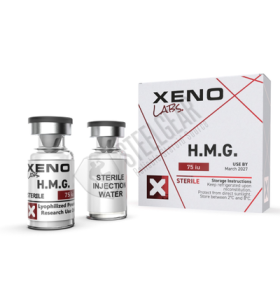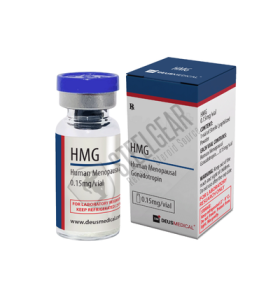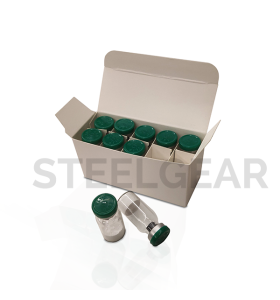Buy HMG Online – Fertility & Testosterone Recovery for Bodybuilders & TRT Users
HMG – Human Menopausal Gonadotropin is a hormonal treatment that can be used in different therapies one of which is fertility treatments in both the male and female. It contains two key hormones: Those are Follicle Stimulating Hormone(FSH) and luteining Hormone(LH) these hormones are very vital in the reproductive organs. HMG is sourced from the urine of postmenopausal women because high levels of these hormones are produced and this hormone is utilized in treatment of infertility with the help of assisted reproductive technologies including IVF among others.
In men, it enhances the production of sperms while for women, it assists in the releasing and maturing of a woman’s eggs. This is an article that will give you insights on the use of Gonadotropin in fertility, its uses, advantages and purpose and also seeks to address the most frequently asked questions on Gonadotropin – a fertility boosting agent.
Benefits and Uses of HMG
Some of the benefits of HMG include the following especially within the perspective of fertility issues in men and women. Here are some key advantages and uses:Here are some key advantages and uses:
1. Promotes Ovulation in Women
Employment of HMGs in women is mainly for the purpose of wrenching mature eggs from little ovaries. This therapy may be used by women who have irregular menstrual cycles, or those who produce less than one ovary per cycle, like women with polycystic ovary syndrome (PCOS) or anovulatory women. This favours the growth of multiple eggs hence raising the odds of fertilisation during procedures that involve ART such as IVF.
2. Stimulating sperm production in men
HMG is used to treat men with low sperm count or poor sperm quality, which may be as a result of hormone deficiency that keeps the testes from producing optimum numbers of sperm. Furthermore, HMG raises FSH and LH levels in men and hence increases sperm count and motility hence increasing chances of conception.
3. Assisted Reproductive Technology or ART
HMG may be administered together with other fertility medicines throughout the process of ART such as IUI or IVF. It assists in the production and collection of several eggs which in turn are fertilized hence raising the prospects of pregnant women or couples experiencing difficulties in conceiving.
4. Restoring Hormonal Balance
In both sexes, HMG can return the hormonal profile of reproductively active hormones to normal levels especially when natural synthesis is wanting. It aids in bringing good function of the reproductive organs because it supplies FSH and LH hormones to the body.
Dual-Action Step: How HMG Works in Men and Women
Some importance of HMG relates to its usage in the stimulation of reproductive function in individuals of both genders, although with certain modifications that are based on the subject’s gender.
For Women
Since the case of women, HMG is administered in order to promote the development of follicles in the ovaries. These follicles contain the eggs and with the aid of FSH and LH, the eggs develop and ripen to normal eggs for ovulation. LH stimulates the release of these eggs so that they can be fertilized through intercourse or ART processes. The administration of HMG aids in augmentation of the number of egg available so enhancing the prospects of conception or pregnancy particularly where normal ovulation is not evident or offered.
For Men
In men, HMG acts by inducing the Leydig cells in the testes to secrete testosterone, which is very crucial in spermatogenesis, or the process of sperm production. FSH controls the maturation of sperms and LH raises testosterone levels in the body thereby preparing the environment for sperms. It is for these reasons that dual hormone action of such agents is said to support enhanced sperm count, quality, and cell movement, all of which are beneficial for conception.
FAQs
1. Although it has been presented as utilised only in operations related to fertility treatments, is HMG useful in other medical situations?
HMG is most widely used in fertility treatments however it can be further used in treating some hormonal problems in both the sexes. But the main function is for health of reproductive organs and the need to increase the likelihood of conception.
2. Are there side effects that are associated with the health maintenance gizmo or HMG?
HMG is usually safe, but some persons may develop side effects in the form of swelling of tummy, slight pain in the stomach or breast discomfort in women. Side effects which may occur include erythema at the place of injection, increased testosterone effects like formation of acne or hairiness. There may be some severe impact on the patient as in the case of women; ovarian hyperstimulation syndrome (OHSS) is rare but should be closely observed.
3. How is HMG administered?
HMG is available in the form of solution for injection which is normally administered subcutaneous or intramuscular either by the patient him/herself or under the guidance of a physician. It depends with the amount of fertility needs of an individual and the procedure being taken by the doctor or being followed.
4. Is it possible to use HMG together with other fertility drugs?
Indeed, HMG may be combined with other fertility medications such as clomiphene citrate or GnRH agonists to enhance fertility treatment results. Your fertility specialist will have to design your treatment regimen depending on your condition as well as personal preference.
Conclusion
The HMG (Human Menopausal Gonadotropin) is a potent and all rounded medicine for infertility in both sexes. Being a combination of hormones FSH and LH, HMG helps women to produce eggs and ovulate while in men it helps in sperm production. This dual-action capacity makes it significant in procedures by which pregnancy is accomplished, including In-Vitro-Fertilization, where hormonal control is essential for positive pregnancy result.
Most notably for the female patient, it can remedy the problem of ovulation in the women and enhance the quality of the eggs likewise, for the male patient, it can help amplify the sperm count coupled with motility in clients diagnosed with infertility due to the male-factor


























